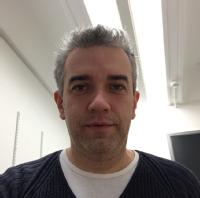Data Science News
Dr. Charilaos Efthymiou joins the department as a new Assistant Professor
The Department is welcoming our new Assistant Professor Dr. Charilaos Efthymiou, who will be associated with the Division of Theory and Foundations (FoCS) and the Centre for Discrete Mathematics and its Applications (DIMAP).
Before joining us, Charilaos held research positions in various universities including Goethe University of Frankfurt, Germany, as a DFG Fellow, College of Computing at Georgia Institute of Technology, USA, and School of Informatics a the University of Edinburgh, UK. This is not his first time at the University of Warwick, he has been a post-doc researcher at DIMAP (2010-2012). Charilaos completed his PhD at the University of Patras, Greece, in 2009.
His research is in the intersection of theory of algorithms, discrete mathematics and statistical physics. Specifically, he studies how powerful notions from statistical physics, e.g., phase transitions, affect the performance of algorithms for various problems in computer science and mathematics.
More information about Charilaos can be found on his personal web-page https://sites.google.com/site/charisefthymiou/.
Facebook Fellowship awarded to Jeremias Knoblauch
Jeremias Knoblauch, a second year PhD student supervised by Dr. Theo Damoulas (Warwick CS & Stats), has been selected as the first graduate student based in the UK and as one of only 21 graduate students worldwide to receive the Facebook Fellowship award.
Warwick awarded £2.3 million to help develop cutting-edge technologies for cancer diagnosis and personalised treatment

The University of Warwick has been awarded £2.3 million of the funding as part of a £15m project, and will work with partners and experts at the lead partner University Hospitals Coventry and Warwickshire NHS Trust, Royal Philips and teaching hospitals and universities at Belfast, Oxford and Nottingham in the three-year project, focussing on breast, prostate, lung and colon cancers.
The aim is to significantly speed up the time in which cancer is diagnosed and treated, by using Innovative solutions in digital pathology and Artificial Intelligence (AI).
The PathLAKE (Pathology image data Lake for Analytics, Knowledge and Education.) consortium aims to meet the ‘Data to Early Diagnosis and Precision Medicine Challenge’ through two high-impact exemplar projects. Firstly, by embedding and demonstrating the diagnostic efficiencies of computer aided testing of pathology samples. Secondly, by developing novel AI tools to support advanced identification of predictive chemotherapy response markers for personalised medicine and markers of disease progression in disease surveillance.
Working ethically within stringent regulatory and industry standards, a unique data resource comprising of large number of pathology images will provide a foundation archive to support exemplar projects in AI based diagnostic efficiency and optimal treatment selection. These images and tools will be made available across the consortium partners, which includes Philips, Nvidia and four SMEs (Small and medium-sized enterprises – independent firms) in Perspectum, Oxford Cancer Biomarkers, Glencoe Software and Sonrai to support the development of a burgeoning UK digital health industry. The consortium will also provide the backbone of a network for multi-site clinical trials and further advanced research projects to provide world-class training and education to the pathology and computer science communities.
Professor Nasir Rajpoot, head of the Tissue Image Analytics laboratory at the University of Warwick, will be leading the computational arm of the centre, comments:
We are thrilled by the news of this award. The PathLAKE centre of excellence will play a leading role in the development, validation and implementation of AI in cellular pathology. The centre data lake will be an invaluable resource for AI researchers and UK based SMEs, enabling the development of cutting-edge AI algorithms for cellular pathology as well as capturing and revealing trends and patterns in the pathology image data for better understanding of disease and improved provision of patient healthcare.”

